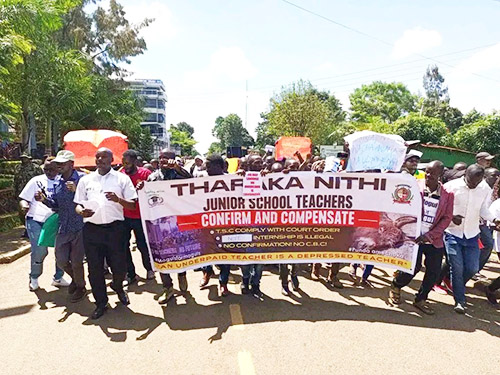The National Treasury has announced that the employment of Junior Secondary School (JSS) teachers will commence in January 2025. This move is part of the government’s broader efforts to enhance and support the education sector in Kenya.
National Treasury Cabinet Secretary John Mbadi confirmed that funding has been allocated in the budget to facilitate the recruitment of new JSS teachers. Despite previous financial challenges that delayed the hiring process, the CS reassured the public that the necessary funds are now in place to begin teacher recruitment early next year.
“There was no money to immediately employ JSS teachers, but there is money to employ them from January; we have the budget. It is there,” said CS Mbadi.
Support for Education Infrastructure
In addition to addressing the staffing of JSS, the Treasury has also committed to improving infrastructure within schools. CS Mbadi revealed that Sh3.4 billion has been released for the construction of new classrooms, which will accommodate the growing number of students entering Junior Secondary. The World Bank has also provided support, ensuring that the classroom construction initiative is on track.
“We will have classes,” Mbadi confirmed. “Additionally, the funding for building classrooms has been effected jointly with the NGCDF funds, even in the face of the cash constraints that Kenya finds herself in.”
Long-Standing Commitment to Education
The issue of hiring JSS teachers has been a recurring topic of concern for educators, parents, and stakeholders in the education sector. Earlier measures proposed by the government to address the staffing gaps had faced delays, leaving many JSS classrooms understaffed since the curriculum’s implementation. However, the latest funding allocation signifies a commitment to resolving these challenges and supporting the new education framework.
The gradual recruitment of teachers will begin in January 2025, providing much-needed relief to schools struggling with limited teaching staff. The announcement has been met with optimism from educators who have long advocated for a more robust workforce to manage the transition and implementation of the Competency-Based Curriculum (CBC) at the JSS level.
Ongoing Efforts to Strengthen the Sector
The Treasury’s plans to hire more teachers and improve school infrastructure align with Kenya’s larger goal of enhancing the quality of education nationwide. By addressing teacher shortages and improving learning environments, the government hopes to bolster the implementation of the CBC, which aims to provide a more comprehensive, skill-based learning experience for students.
As schools continue to prepare for the gradual roll-out of the new curriculum, the employment of additional JSS teachers will be a critical step in ensuring that educational standards are maintained. For now, stakeholders will be watching closely as the government begins to implement these funding plans in the coming months.
Future Outlook
With the allocated funds, the construction of new classrooms and the hiring of JSS teachers are set to significantly impact Kenya’s education sector positively. While the country continues to navigate financial constraints, the strategic use of resources, including support from international partners like the World Bank, signals a collaborative effort to invest in the future of Kenyan education.



